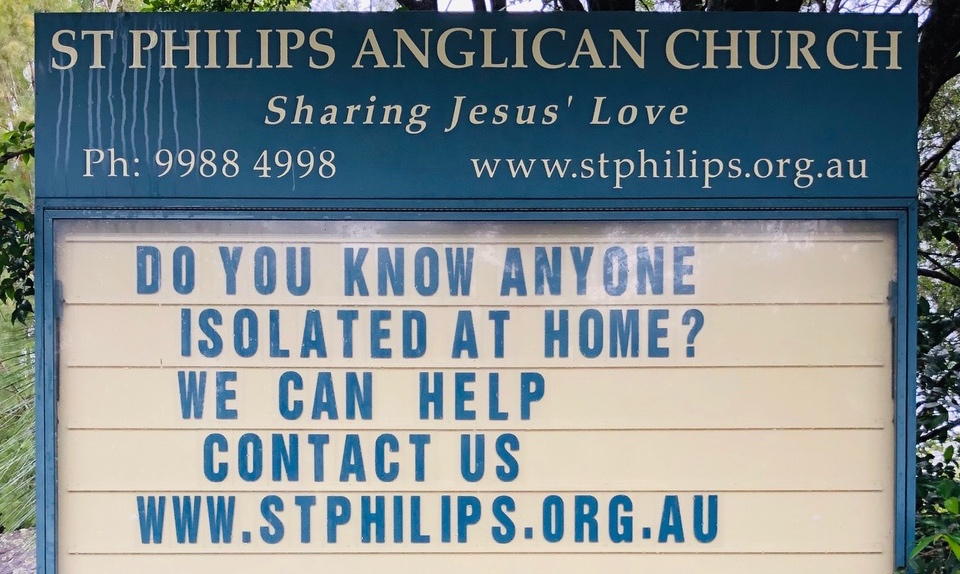
CHRISTOPHER GILBERT reports on how Australian churches are grappling with how to respond to the COVID-19 crisis…
Last updated: 4pm
Sydney, Australia
When a Sydney Anglican parish council met at 7am this week, they wrestled with how to keep their almost 100 people meeting for Sunday worship. News of university, business and office closures in the previous evening’s news meant that uppermost for their meeting was, “What now, for us?” Six women and five men, spaced at 1.5 metres apart, deliberated with great uncertainty.
The council, which asked not to be named, had a full agenda, but most of it geared toward keeping their worship services happening. A proposal to video stream services was whittled down for lack of music licences and privacy concerns to, “just the sermon”. Communion required new hygiene arrangements. A likely financial shortfall of at least 25 per cent had to be cut from budgeted expenditure immediately. Bible study groups would meet online. They would cut Easter services down to a format, size and times that reflected the virus crisis, and a pastoral care team would care for those sick or in isolation even as far as people on the far edges of the church’s network.
And if someone develops COVID-19? Would that end worship gatherings altogether? Could they lead worshippers into caring for the sick and the isolated? Mostly unspoken, they held an expectation of having to close down, but just not yet.
Only an hour later, many of their decisions became moot, as the Archbishop of the Sydney Diocese informed every Anglican parish council that all worship services must cease henceforth, until the crisis of COVID-19 infections had passed.
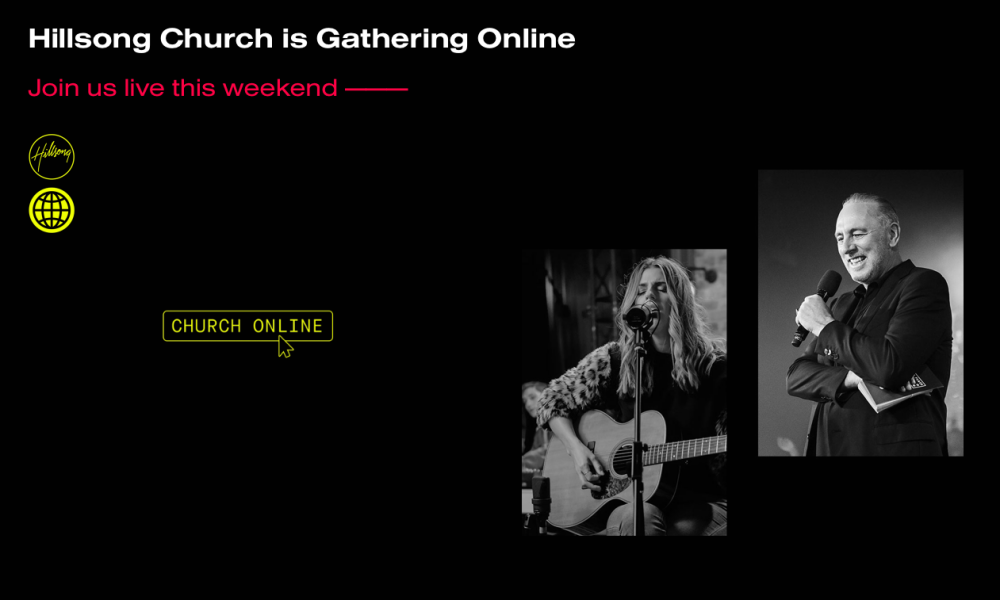
Hillsong was among the first churches to go virtual. – a screenshot from their website. PICTURE: Screenshot.
Such is the reality for churches in Australia dealing with this particular coronavirus. The only apparent continuity option is to live-stream a church service but with no audience? And if without a license, no music?
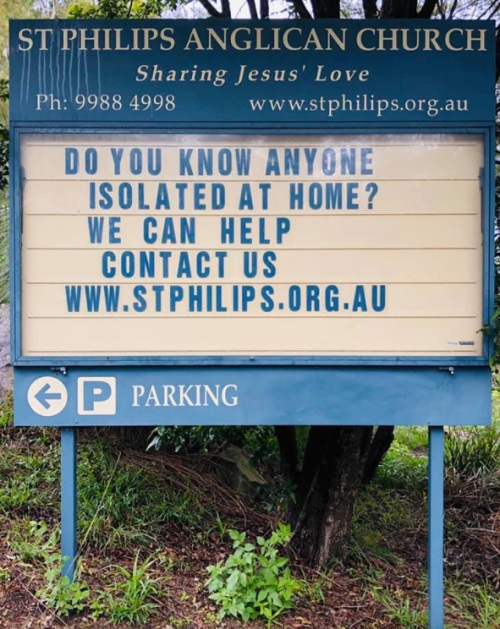
A sign at St Philip’s Anglican Church in South Turramurra, Sydney.
“I believe our church community has an important role to play in the coming months in providing practical care and support for older and vulnerable people in our church and local community, who may find themselves isolated at home. Small groups will continue and become the locus for our fellowship in the coming months while there are no Sunday services.”
– Rev Jaime Dickson of St Philip’s Church in South Turramurra in an announcement to his congregation.
Sydney-headquartered Hillsong was among the first of the very large churches to go virtual. A day after a video message announcing the change, the church launched a comprehensive online channel linking to all Hillsong’s Australian and international worship services, with only a few links yet to be activated. This in itself seems likely to impact Hillsong in ways that seem hard to imagine since worshippers will be able to “attend” virtual services at almost any time of day and night through the world’s time-zones according to their preferences. What will this mean for local church attendance in the aftermath? A spokesperson simply said, “In line with government regulations all Hillsong services are now only online.”
Rev Jaime Dickson of St Philip’s Church in South Turramurra anticipated the effect of COVID-19 on his church’s meetings on 16th March and cancelled worship services. He posted to his congregation that they become creative in finding ways to keep in fellowship through the crisis.
“I believe our church community has an important role to play in the coming months in providing practical care and support for older and vulnerable people in our church and local community, who may find themselves isolated at home,” he says. “Small groups will continue and become the locus for our fellowship in the coming months while there are no Sunday services. We will most likely be having a weekly ‘virtual church’/webinar kind of thing using Facebook Live. Some prayer, Bible reading, a talk. I don’t want to call it ‘church’ because it’s not if the church is not gathered together. Still working on that with staff today…”
Rev Paul Dale senior minister of Church by the Bridge wrote to his congregation about going virtual on 18th March: “I am reminded of the Israelites ‘waiting’ to cross the Jordan River in Joshua 3, waiting with the unknown as to how the next steps might unfold. It’s interesting to note what God did not do; God did not just pick up his people and deposit them safely on far side. Rather he asked them to trust Him and depend on Him and obey Him as they waited – and then cling to him as they walked into the unknown. It is clear that God is now calling us to wait, yet we must continue to trust Him, depend on Him, obey Him, as well as loving our neighbour well.”
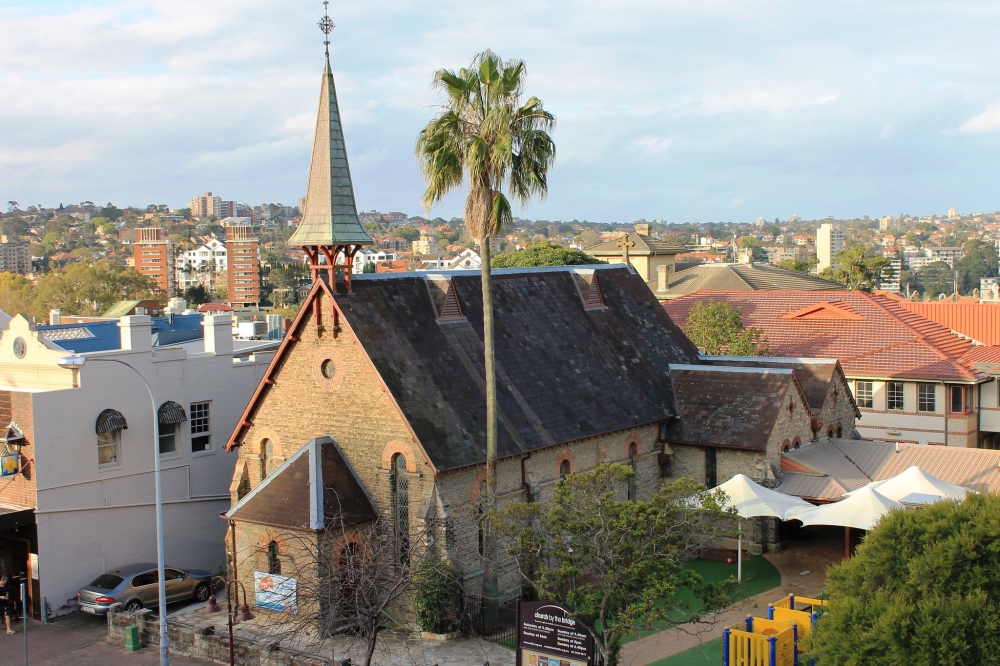
Sydney’s iconic Church by the Bridge is among those which has closed its (physical) doors. PICTURE: Mertie . (licensed under CC BY 2.0)
The Catholic Archbishop of the Sydney Diocese is also trying to answer the “what now” for his adherents in a pastoral letter issued on 18th March.
He writes, “What does that require of us at present? Several instructions have already come from health authorities and the Church. Outside gatherings of more than 500 people and indoors gatherings of 100 have been forbidden; in due course the public celebration of Mass may have to be suspended.”
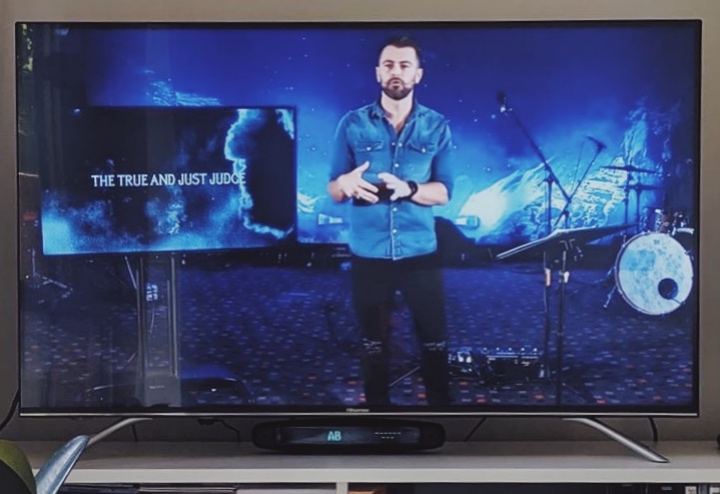
Guy Mason, senior pastor of Melbourne-headquartered City On A Hill, says all services will now be streamed via the internet
ANGLICAN MOVEMENT CITY ON A HILL CLOSES SOME DOORS BUT OPENS OTHERS
Melbourne-founded Anglican movement City On A Hill is among church organisations which this week made the decision to hold all services online instead of physical gatherings.
“We’re closing doors in some regards but we’re opening new doors in a different way,” says the movement’s founder and senior pastor Guy Mason, speaking to Sight on Tuesday – the same day the church made the decision to go virtual.
Founded in a brewery in Melbourne’s Docklands in 2007, City on a Hill is an Anglican movement with seven churches, predominantly in Victoria, but in Queensland as well. Its services have more a contemporary feel than traditional Anglican services and, while it has some 2,500 congregants of all age groups attending services, it’s weighted towards a younger demographic.
As well as holding online services and some small groups in a virtual environment, it will be looking at how it can continue running it’s homeless services and ministries to the elderly.
“Where possible, we’re running a virtual community…” Mason says. “My sense is that we’re preparing for, certainly more than a few weeks…It will be for a season.”
Mason, who notes the church had made the decision after looking at the government advice and considering public sentiment and safety, says he has been very encouraged by the response of the church members to the announcement.
“There’s been a lot of support, a lot of encouragement and a lot of understanding,” he says.
Mason says that while the vast majority of congregants are familiar with the sort of technology the church will rely on, they’ll be exploring different ways to ensure everyone can be connected.
“We will go above and beyond to see how we can support [people],” he says. “And I would love to imagine within our community we’d have ample support, particularly in the technological space, to help someone out, whether that’s visiting someone and giving them something they can use or helping out in that way. Absolutely, we want to make sure that everyone can be connected.”
Mason says the church wants to continue to be a voice for faith, hope and love through the crisis.
“The church has always been the people, not the bricks and mortar, so, in some sense, we’re well prepared for a moment like this. We’re ready to serve, we want to care for people as best we can [and] we want to offer hope.”
– DAVID ADAMS
He goes on to encourage his parishioners to see the moment as opportunity for spiritual retreat, prayer, and the service of those in need, since this is only temporary and endurable. He himself has been tested for COVID-19 and the result is negative.
The Uniting Church in Australia NSW/ACT Synod has issued advice to its leadership accessed on 19th March that includes: “The very strong recommendation is that we should not be meeting in person in any gathering. As Paul long ago advised, ‘whenever we have an opportunity, let us work for the good of all, and especially for those of the family of faith’ (Gal 6:10). Our commitment to the common good mandates that we proceed in this direction.”
Wesley Mission, which has 11 congregations in New South Wales, announced earlier this week it would be holding services online. In a statement released on Wednesday, Superintendant Rev Dr Keith V Garner said the church will be ceasing in person Sunday services as of this weekend but “continue in our life of faith together through worship services online, devotions and prayer via creative means and utilising the resources produced as part of our long-standing TV and media ministry”. Online services will be held in Indonesian, Mandarin and Samoan as well as English.
“Refraining from gathering in person is not a decision I take lightly, particularly as some among our congregational life are living on the margins of society and have limited access to technology,” Garner said. “But this is an important step as we respond to necessary medical advice and continue to demonstrate our care and concern for each other and to the city we serve.”
In the island state of Tasmania, which has closed its borders, the sense of urgency has taken hold as well. The Anglican Diocese of Tasmania pre-empted the Sydney Diocese and halted all public worship services for the foreseeable future as of 17th March.
But the churches in other states are not shutting down services with the urgency of their New South Wales counterparts. The Uniting Church’s Synod of South Australia seems keen to maintain its worship gatherings and home group gatherings within Federal Government limits for as long as possible. The Catholic Diocese of Townsville is also treading softly to maintain Mass in the parishes but within government limits of less than 100 people. The bishop is issuing dispensations for non-attendance to the elderly and those in isolation. However in Brisbane, the Anglican Diocese of Southern Queensland has cancelled all worship services as of 23rd March, and advises earlier cancellation if communication to parishioners allows.
The Baptist’s of Western Australia at 20th March are similarly reluctant to lose their gatherings but strongly encouraging their congregations to live stream services and develop creative strategies for continuing their fellowship with one another and concern to look out for the local community needs. Their informational page contains links to the Victorian Baptist Union’s suggested responses and a US resource of 100 ways to manage the crisis. But this is in contrast with the Baptist Churches of NSW/ACT which advise their people: “Transfer happens most when people are in proximity to one another. Therefore, out of love for our communities, there is good reason to suspend gatherings and activities now.”
Along with parish councils and other church leadership bodies, Christian schools and undergraduate Colleges like Excelsia College at Macquarie Park in Sydney face similar difficult decisions about continuing classes.
As of 18th March, CEO Peter McKeon said, “The risk of infection on campus is still low and the campus remains open”. He says the college has instituted all of the advised measures to minimise risk and is using the available technologies too.
“From Monday 16th March, we implemented a hybrid teaching model whereby students and staff have the choice of attending the campus or accessing or teaching the course material from home.” McKeon said. “We will continue to monitor the situation and are ready to go fully online when it is needed.”
By this week’s end some teachers report that most early childhood education and business students were accessing classes remotely, and some teachers delivered their courses from home. Drama and Music students and teachers continue to attend in person out of necessity.
McKeon suggested that Christians might find guidance in response to COVID-19 from Martin Luther, a Catholic monk who led the Protestant Reformation. He lived through the bubonic plague in Europe.
In a century of pandemic and death, Luther gave guidelines for faith and practice in the midst of a horrific contagion way back in the 1500s: “I shall ask God mercifully to protect us. Then I shall fumigate, help purify the air, administer medicine and take it. I shall avoid places and persons where my presence is not needed in order not to become contaminated and thus perchance inflict and pollute others and so cause their death as a result of my negligence…If my neighbour needs me however I shall not avoid place or person but will go freely as stated above. See this is such a God-fearing faith because it is neither brash nor foolhardy and does not tempt God.”
Christopher Gilbert is an associate lecturer at Excelsia College.
– with DAVID ADAMS






